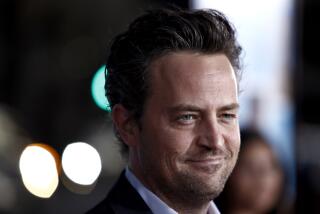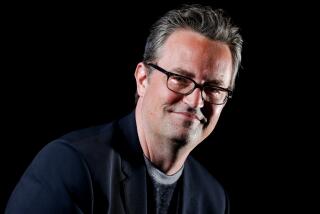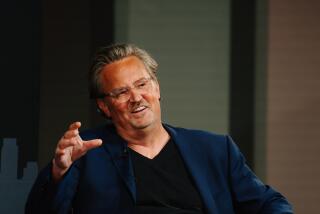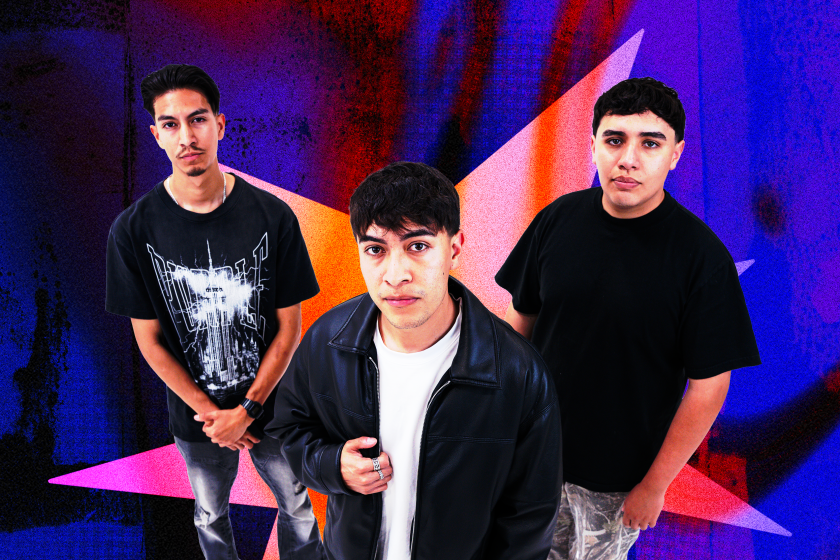Jackson doctor’s attorneys set to blame the pop star himself
- Share via
As the trial of the Houston cardiologist accused of causing Michael Jackson’s overdose death gets underway Tuesday, the doctor’s attorneys are preparing to argue that the blame should be pointed at the other person who was in the room: the King of Pop himself.
Jackson may have injected the lethal dose, or drunk it, attorneys for Dr. Conrad Murray have suggested. It may have been out of financial desperation, pressure to perform or anxiety about his career comeback, they’ve said.
Blaming the patient for his or her own death, legal experts say, is a common defense in the small but growing number of cases of doctors charged in connection with overdose deaths, where a patient’s desperate search for drugs collides with a physician’s responsibilities.
Full coverage: The trial of Conrad Murray
“There’s a fundamental human theme that occurs in all of these cases, that is how much the defense can paint the addict as this powerful driving force, in some sense bent on killing himself,” said Peter Arenella, a law professor at UCLA and an expert in criminal procedure. “If the jury starts viewing the victim in that light, it’s easy for them to acquit the doctor of any serious criminal charge.”
Murray, 58, faces a charge of involuntary manslaughter, injecting Jackson with the dangerous surgical anesthetic propofol at the entertainer’s rented Holmby Hills mansion and leaving his bedside. Murray told police he gave Jackson the drug — the singer referred to it as “milk” — over a two-month period to help him sleep, even though it has no established use for insomnia. If convicted, Murray faces a four-year sentence and likely loss of his medical license.
On Monday, on the eve of opening statements at the trial in downtown Los Angeles, Murray’s lead attorney asked the judge to admit another piece of evidence that he said would help prove their case that “Michael Jackson was involved in certain acts that ended his own life.”
“We think that he was desperate at the time that he did that,” attorney Ed Chernoff told Los Angeles County Superior Court Judge Michael Pastor, asking that Jackson’s contract with concert promoter Anschutz Entertainment Group be allowed at trial.
It’s a case that’s been made — not always successfully — by other defense attorneys.
An attorney for a Georgia physician charged with felony murder for a patient’s death on a mix of painkillers argued that there was “no foreseeable risk of death” from the doctor’s point of view because the drugs would not have been lethal if taken as directed. His conviction was upheld earlier this year by the state’s Supreme Court, which ruled that the doctor was aware of the victim’s drug problems and “nonetheless provided him with drugs dangerous to such a person.”
The defense of a Florida physician convicted of manslaughter in 2002 for four painkiller deaths argued that the decedents were addicts who had duped a sympathetic doctor into giving them the medication.
Attorneys for a Tennessee plastic surgeon charged with providing medication that led to his fiancee’s drug abuse death contended in legal papers that the woman had caused her own death, writing that “it was her apartment, her medications, and her prescription bottles.” The doctor died of a heart attack during an appeal of his second-degree murder conviction.
In pinning the blame on Jackson, Murray’s attorneys have zeroed in on two facts: the size of the dose Murray told police he gave Jackson, and the time Murray spent away from Jackson’s bedside. The 25-milligram dosage, half of what Murray had previously given Jackson, was not nearly enough to have caused his death, and the doctor was away long enough for Jackson to have awoken and given himself the fatal dose, they say.
The evidence “strongly cries out that Michael Jackson, who did like to ingest these chemicals himself, more than likely was the one who did that on that day because he did wake up shortly after the dose he received from Dr. Murray,” Joseph Low IV, an attorney representing Murray, told the judge earlier this year.
Deputy Dist. Atty. David Walgren has suggested that Murray could have lied to police about the amount he injected. And even if Jackson was the one who administered the fatal dose, prosecutors argued, Murray is just as guilty of homicide based on standard of medical care for leaving his patient in a circumstance in which he could harm himself.
In inserting Jackson’s own actions into the picture, Arenella said the defense was trying to plant doubt in the jury’s mind about whether the doctor’s actions ultimately caused the singer’s death. Even if the defense successfully argues that Jackson injected or drank the propofol, if prosecutors are able to show the doctor allowed for that to happen, the jury could still find Murray guilty of the involuntary manslaughter charge, Arenella said.
“What’s really important is, given how foreseeable it is that patient wants more, was the doctor responsible for making the extra consumption available?” he said.
Blaming Jackson could be a risky move, experts said, because Murray may appear to be shirking his duties as a physician.
“You risk a binary reaction from jurors.... It’s like putting it all on red in Vegas,” said Bryan Liang, a professor at California Western School of Law in San Diego and also a physician. “Ultimately, the responsibility falls on the person with the medical knowledge.”
Who Jackson is may also be a factor in how the argument is received by jurors. Defense attorneys hinted during jury selection that in portraying Jackson as desperate enough to cause his own death, they may bring up less-than-flattering tidbits about the singer’s life.
Half of the final panel of jurors indicated on their questionnaires that they had at one point considered themselves fans of the pop star. Chernoff, in his questions to the jury pool, asked panelists if anyone would have trouble holding Jackson to the same “standard of responsibility” as anyone else. No hands were raised.
Outside court, Chernoff said he wasn’t concerned about how the defense strategy would be received by the panel. If it upsets the jury, so be it.
“I’m going to tell the truth,” the attorney said, “and let everyone else handle the rest.”
Full coverage: The trial of Conrad Murray
Times staff writer Harriet Ryan contributed to this report.
More to Read
The biggest entertainment stories
Get our big stories about Hollywood, film, television, music, arts, culture and more right in your inbox as soon as they publish.
You may occasionally receive promotional content from the Los Angeles Times.










